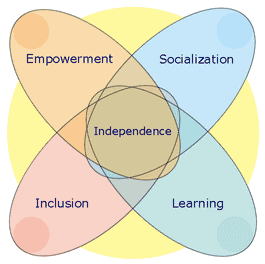

| An L3D project funded by the Coleman Institute |

|

|
|
 |
 |
The
mission of the Cognitive Lever, or CLever, project is to develop computationally
enhanced environments designed to assist not only people with a wide range
of cognitive disabilities, but also their support community.
Our research group at CU has been focused for the last 15 years on Intelligence Augmentation (IA) approaches with the objective of complementing, empowering and augmenting human capabilities. We believe that individuals follow very different learning paths. Our goal is to create environments that match individual needs and learning styles. It is our hope that people at all cognitive levels (ranging from severely disabled to extremely gifted) will greatly profit from the conceptual frameworks and systems which we are developing. For an overview
of the Cognitive Lever Project please see a five minute video demonstrating
our vision. |
|
|
Empowerment,
socialization, inclusion, and learning lead to independence and are the
cultural dimensions and objectives of our project.
|
Our research is focused around three major areas:
Specific research topics that will be addressed include:
|
|
Last updated:
September 3, 2004
|
|
This site is maintained by the
Center for LifeLong Learning and Design
|
|
Direct any questions or comments regarding this site to the
L3D Webmaster
|